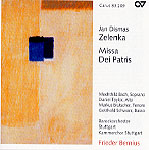If you like the vocal music of J.S. Bach, why not try a work by a contemporary whom Bach admired and whose style, although different from the master’s, maintains its own highly refined yet original character? Bohemian composer Jan Zelenka (1679-1745) spent the last 35 years of his life in Dresden, first as a double bass player and then as composer for the court, writing primarily for the church. This monumental Mass (“in honor of God the Father”) is one of several he composed in the last years of his life, and its structure–the main parts of the mass are subdivided into smaller sections–allows for a wide variety of scoring, including different configurations of soloists, solo arias, chorus alone, and chorus with solo singers. Zelenka also fully employs his orchestra to drive and guide and support the vocal parts as well as to add colorful commentary for the texts. He proves to be a master at lovely (Crucifixus) and lively (Cum sancto spiritu) fugal writing, and isn’t afraid to insert occasional surprising harmonic changes throughout that keep your attention and add pertinent emphasis to a word or significant textual passage. After the very wordy “Et resurrexit” section, bolstered with interesting orchestral “effects”, Zelenka follows by turning the chorus loose for four and one half minutes on a single line–“Et vitam venturi saeculi. Amen.” (And the life of the world to come)–leaving little question as to how this deeply religious composer feels about that statement’s importance.
Generally the singing and playing are first rate, and conductor Frieder Bernius, whose Stuttgart Chamber Choir has made many fine recordings for labels such as Sony Vivarte, keeps things crisply moving along while demanding both precision and ardent expression. The disc’s somewhat dry sound only slightly inhibits the at once robust and cleanly articulated orchestral playing. Oddly, bass Gotthold Schwarz seems to have two different voices–a squeezed-throat one that he employs in upper registers and a darker, rounder, baritonal one that appears in his lower range. As a result, his extended aria (Benedictus) is a far less enjoyable listening experience than it should be, given Zelenka’s very attractive setting. However, the unevenness of the Benedictus is more than compensated for by Daniel Taylor’s gorgeous alto solo (Agnus Dei), in which he takes full advantage of and pleasure in the exquisite writing, which is worthy of comparison to some of Bach’s finer creations in the genre. Zelenka’s sacred vocal works have been re-discovered only relatively recently, and on evidence of this excellent production it’s time we listeners got to know it a lot better.
































